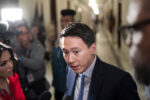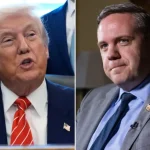
TikTok filed an emergency application on Monday imploring the Supreme Court to temporarily block a law that would effectively ban the popular social media app.
Under bipartisan legislation signed into law by President Joe Biden in April, Tiktok faces being banned in the U.S. on Jan. 19, 2025, unless the app’s Chinese parent company, ByteDance, sells the platform to a non-Chinese-owned company.
TikTok has argued that the possible ban set in motion by the Protecting Americans from Foreign Adversary Controlled Applications Act violates First Amendment rights. The app made the same claims in its latest court filings.
“Congress’s unprecedented attempt to single out applicants and bar them from operating one of the most significant speech platforms in this nation presents grave constitutional problems that this court likely will not allow to stand,” the social media platform wrote in its emergency application on Monday.

While lawmakers on both sides of the aisle have expressed concern that the Chinese-owned platform could pose a grave national security risk to the U.S., Tiktok’s lawyers said the new law posed a “speech ban,” worrying that it “will silence the speech of applicants and the many Americans who use the platform to communicate about politics, commerce, arts, and other matters of public concern.”
The U.S. Court of Appeals in Washington, D.C., refused TikTok’s request to delay the implementation of the law just three days ago, prompting the company to turn to the highest court in the country.
TikTok requested the Supreme Court make its decision by Jan. 6, less than two weeks before 170 million users across the country could lose access to the social media platform.
The ban is set to go into effect the day before President-elect Donald Trump’s inauguration on Jan. 20.
Trump has signaled he could be open to negotiations on keeping TikTok alive, saying during a press conference on Monday that he holds a “warm spot in my heart” for the platform because it helped him win young voters and clinch a second term in the White House.
CLICK HERE TO READ MORE FROM THE WASHINGTON EXAMINER
“We’ll take a look at TikTok,” Trump said. “I have a warm spot in my heart for TikTok because I won youth by 34 points, and there are those that say TikTok had something to do with that.”
The president-elect reportedly met with TikTok CEO Shou Chew at his Mar-a-Lago resort in Florida on Monday.







